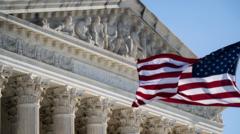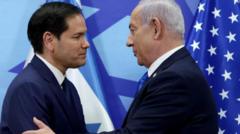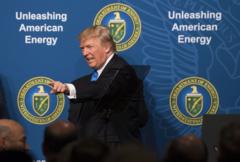The spirits industry is confronting significant uncertainty as impending tariffs threaten its export market, particularly in Europe, raising concerns among distillers and industry advocates.
### Spirits Industry Faces Renewed Trade War Challenges

### Spirits Industry Faces Renewed Trade War Challenges
As tariffs on American whiskey loom, industry leaders scramble to mitigate potential losses in the wake of potential European Union tax hikes.
With the impending reinstatement of tariffs on American whiskey and spirits, industry representatives are urging policymakers to prevent further damage to their market position and avoid dire retaliatory measures.
As the chill of a potential new trade war settles in, liquor lobbyists in Brussels recently exchanged concerns over cocktails aptly named “Toasts Not Tariffs.” Their anxiety stems from a historical backdrop—two years prior, the spirits industry found itself caught in the crossfire of a global trade dispute when President Trump imposed tariffs on international partners.
A notable retaliatory measure was a 25 percent tariff on American whiskey introduced by the European Union, strategically aimed at Kentucky’s influential Republican Senator Mitch McConnell. Although tariffs subsided under the Biden administration, the return of Trump's leadership sees the spirits sector facing renewed challenges.
The European Union briefly suspended tariffs in 2021, extending this relief until March 31, 2025. Post-deadline, a significant 50 percent tariff on American whiskey is set to commence, impacting various industries including motorcycles. However, it is the liquor trade that is most vocally expressing fears regarding the potential repercussions.
Industry representatives from both major producers and craft distillers underscore the risk these tariffs pose for their export businesses, particularly in lucrative markets like Germany and France. Concerns extend beyond a single product, as retaliatory tariffs may emerge, potentially affecting an array of alcoholic beverages.
In anticipation of the looming trade scenario, bars are proactively importing whiskey stocks, distilleries are freezing overseas expansion plans, and industry leaders are actively engaging with policymakers in Brussels, Washington, and Rome. Notably, Italian Prime Minister Giorgia Meloni has assumed the role of an intermediary between Trump’s administration and European interests, emphasizing the urgency of the situation for the affected sectors.
As the chill of a potential new trade war settles in, liquor lobbyists in Brussels recently exchanged concerns over cocktails aptly named “Toasts Not Tariffs.” Their anxiety stems from a historical backdrop—two years prior, the spirits industry found itself caught in the crossfire of a global trade dispute when President Trump imposed tariffs on international partners.
A notable retaliatory measure was a 25 percent tariff on American whiskey introduced by the European Union, strategically aimed at Kentucky’s influential Republican Senator Mitch McConnell. Although tariffs subsided under the Biden administration, the return of Trump's leadership sees the spirits sector facing renewed challenges.
The European Union briefly suspended tariffs in 2021, extending this relief until March 31, 2025. Post-deadline, a significant 50 percent tariff on American whiskey is set to commence, impacting various industries including motorcycles. However, it is the liquor trade that is most vocally expressing fears regarding the potential repercussions.
Industry representatives from both major producers and craft distillers underscore the risk these tariffs pose for their export businesses, particularly in lucrative markets like Germany and France. Concerns extend beyond a single product, as retaliatory tariffs may emerge, potentially affecting an array of alcoholic beverages.
In anticipation of the looming trade scenario, bars are proactively importing whiskey stocks, distilleries are freezing overseas expansion plans, and industry leaders are actively engaging with policymakers in Brussels, Washington, and Rome. Notably, Italian Prime Minister Giorgia Meloni has assumed the role of an intermediary between Trump’s administration and European interests, emphasizing the urgency of the situation for the affected sectors.





















